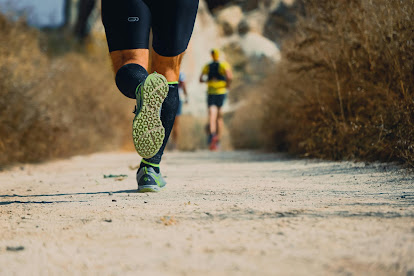Trail running involves running on surfaces such as dirt paths and grassy trails that are unpaved and predominantly natural. An increasingly popular activity since the most recent pandemic, trail running offers a holistic boost to mind, body, and spirit.
For individuals aiming to lose weight, trail running can assist in burning an extra 60 to 90 calories per hour, as indicated by findings from the Medicine and Science in Sports and Exercise journal. This amount of caloric expenditure is approximately 10 percent greater compared to calories burned running on roads and is attributed to the additional challenge posed by uneven terrains.
Trail running presents various challenges, including scaling steep hills and navigating through technical terrains demanding quick reflexes. It also includes nimble footwork while traversing mud, rocks, and roots. Each obstacle conquered during a trail running session adds a sense of accomplishment and adventure.
According to Stanford University researcher Greg Bratman, trail running may offer unique benefits for mental health that urban running may not provide. Although the precise mechanisms through which nature influences these positive brain changes remain unknown, one prevailing theory posits that natural settings, unlike urban environments with crowds, traffic, and unpredictable noise, tend to diminish feelings of threat. This, in turn, potentially deactivates our stress response, which has evolutionary roots.
Trail running provides a mental workout that challenges the brain in unique ways. According to Robbie Britton, an ultra-marathon runner, instead of disengaging or being preoccupied with daily concerns, you must concentrate on the present moment and the challenges of the trail. Navigating a more technical route on trails can significantly enhance cognitive function.
Exercising on diverse terrains such as firm hard-pack trails, mud, flat stretches, and hills through trail running ensures your body activates a broader spectrum of muscle groups. According to Saucony running coach, Tom Craggs, trail running builds the leg muscles and stabilizes muscles in the core of the body, feet, and ankles. The comprehensive muscle engagement required during trail running enhances balance and overall running strength across various terrains.
Greater longevity is a potential benefit of trail running. A study from Harvard revealed that residing in a green space resulted in a 12% lower mortality rate than living in an urban setting. While not everyone can reside in expansive green fields, engaging in trail running enables you to reap some advantages of spending time in green spaces and increased longevity.
Running trails can enable one to break free from negative thought cycles as spending time in nature diminishes rumination, commonly known as entering a harmful thought cycle linked to depression. Research published in Proceedings of the National Academy of Sciences article indicates that a 90-minute walk (or run) in a natural environment reduces this negative brain activity, while performing the same exercise in an urban area does not have a similar effect.
Hitting the trails for a run provides a mini adventure each time, as runners can discover picturesque locations they may have never explored. Venturing up and down monotonous urban streets daily can become mundane. Trail running injects variety into your running experience, offering a medley of sights, scents, and terrains with each passing mile. Even on familiar trails, the landscape transforms based on the season, time of day, and weather conditions.




